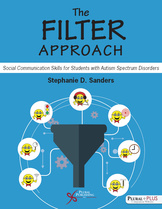Publication

The FILTER Approach
Social Communication Skills for Students with Autism Spectrum Disorders
- Details:
- 383 pages, Color Illustrations (4 Color), Spiral Bound, 8.5 x 11"
- Included Media:
- Companion Website
- ISBN13:
- 978-1-59756-939-2
- Release Date:
- 04/15/2016
Overview
The F.I.L.T.E.R. Approach: Social Communication Skills for Students with Autism Spectrum Disorders is a social skills curriculum workbook for speech-language pathologists (SLPs) and professionals providing social skills training to students or individuals with high-functioning autism, social communication disorders, and/or social anxiety.
The number of children diagnosed with autism spectrum disorders (ASD) is growing at an alarming rate and parents report social skills deficits as their major concern. SLPs are faced with providing social communication language therapy to this growing population.
Stephanie Sanders created this curriculum after verbal attempts to teach the concept of using a "social filter" to students with high-functioning autism. Saying a person "has no filter" is a common expression for a socially inappropriate or abrasive person. However, the connection between a literal and figurative filter makes little sense to high-functioning ASD students. Research and experience confirm the rote memory skills of children with high-functioning ASD and this workbook capitalizes on this to provide a simple, yet memorable tool for conversation. The F.I.L.T.E.R. curriculum first teaches the literal versus figurative filter concept and then presents an acronym for connecting the concept to social skills to help students before, during, and after conversation.
F - Facial clues: look for information about how someone is feeling.
I - Inappropriate: avoid "red light" comments and topics.
L - Listen: tune in to the person talking and tune out distractions.
T - Target: are you hitting or missing the target in conversation?
E - End the conversation (and start it) at the right time.
R - Repair mistakes made in conversation.
School-based SLPs and school counselors will find this approach beneficial in explaining and connecting the conversation filter to critical social skill areas. It provides ease of recall by using an acronym and contains a variety of activities for each social skill area: scenarios, theme-related idioms and expressions, if/then and self-reflection sections, and preview/review questions for each section. For more information on Mrs. Sanders' approach visit www.thefilterapproach.com.
Age range: The author's primary focus was preadolescents and adolescents, and the book is also appropriate for young adults with high-functioning autism that may be need to enhance their social skills.
Preface
Section I. The F.I.L.T.E.R. Approach for Students/Clients
Chapter 1. Introduction
Chapter 2. F. - Facial Clues
Chapter 3. I. - Inappropriate
Chapter 4. L. - Listen
Chapter 5. T. - Target
Chapter 6. E. - End
Chapter 7. R. - Repair
Section II. Answer Key for Therapists
Chapter 8. Answer Key: Introduction
Chapter 9. Answer Key: F. - Facial Clues
Chapter 10. Answer Key: I. - Inappropriate
Chapter 11. Answer Key: L. - Listen
Chapter 12. Answer Key: T. - Target
Chapter 13. Answer Key: E. - End
Chapter 14. Answer Key: R. - Repair
Appendix A. Which Filter Is It?
Appendix B. Curriculum Review
Appendix C. Homework Activities
Appendix D. Data Collection
Appendix E. Idioms and Expressions
About The Author
Stephanie D. Sanders, MA, CCC-SLP, is an ASHA-certified speech-language pathologist (SLP) and the originator of The F.I.L.T.E.R. Approach: Social Communication Skills for Students with Autism Spectrum Disorders. She began her career in the Brevard County Public School System (Florida) in 1996 as an SLP. In addition to working in the public school system for 15 years, she spent six years in private practice as an SLP for pediatric rehabilitation. The idea for this book grew out of her frustration when trying to explain the concept of a "conversation filter" to students labeled as "having no filter."
Purchasers of this book receive complimentary access to supplementary PDFs hosted on a PluralPlus companion website.
Materials:
- Workbook and Activity Pages
To access the materials, log in to the website using the URL and Access Code located inside the front cover of your copy of The FILTER Approach: Social Communication Skills for Students with Autism Spectrum Disorders.






